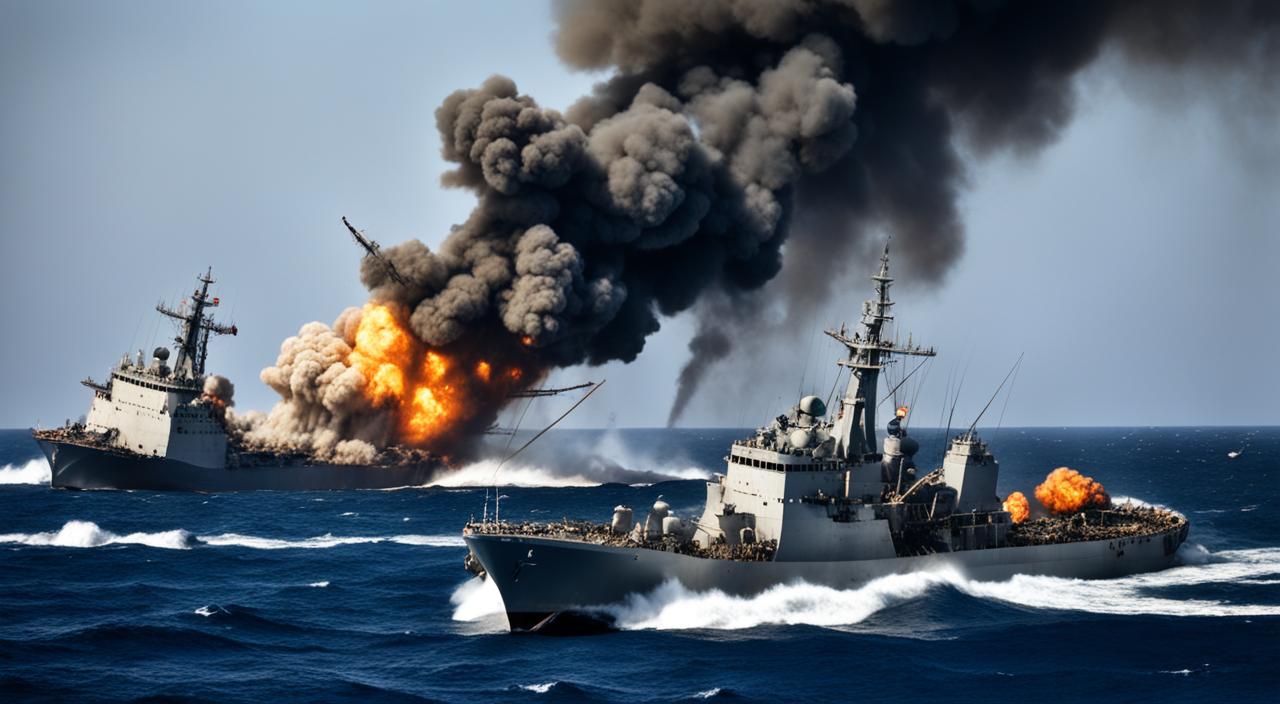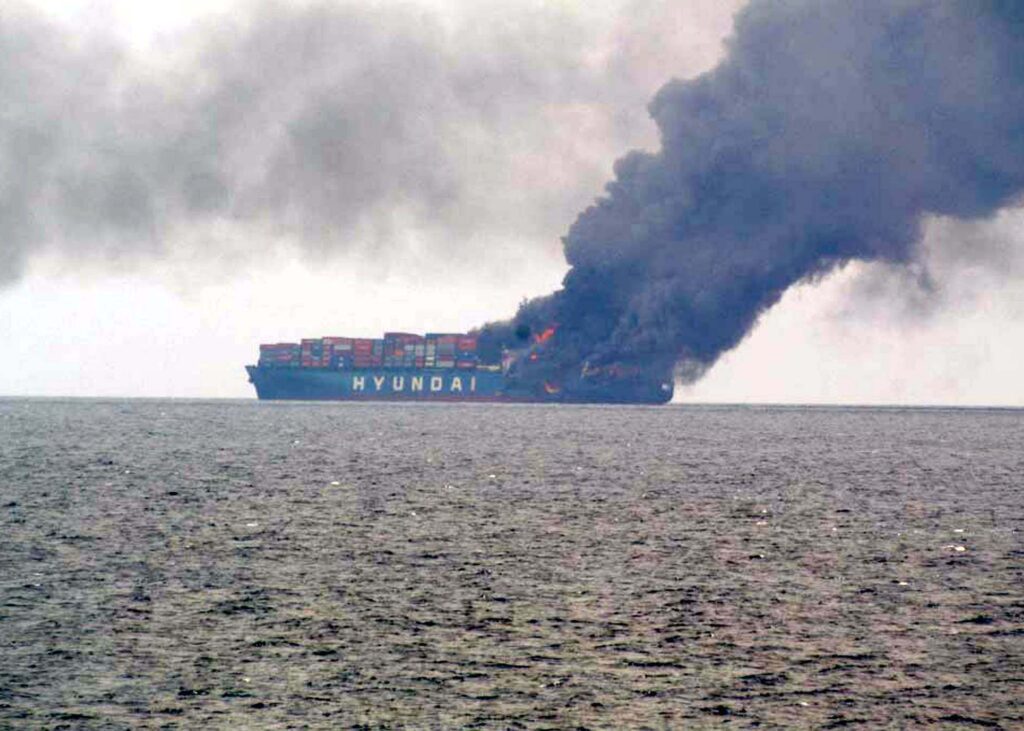
In a major turn, the Yemen conflict has seen a big change. The Houthi rebels took down nearly 90 sea vessels, and three were Israeli ships. This is a serious hit to maritime safety and shows how the Houthis’ tactics can shake up the whole area. By targeting the Israeli ships, they’ve increased the risks and shown how serious this conflict is. It’s a key moment in naval warfare that could change a lot and make tension worse.
Key Takeaways
- The Houthi rebels in Yemen have destroyed up to 90 sea Yemen conflict vessels.
- Three Israeli ships were targeted, indicating a strategic escalation.
- The attacks underscore the profound maritime security challenges in the region.
- This escalation could have far-reaching Yemen conflict implications for both Yemen and Israel.
- The situation raises questions about the future of naval warfare and regional stability.
Background on the Houthis in Yemen
The Houthi movement comes from Ansar Allah in northern Yemen conflict. It started in the early 1990s under a Zaidi Shia leader. After Hussein Badreddin al-Houthi died in 2004, the group became more active.
Origins and Rise
The Houthis began with teaching and helping in northern Yemen conflict. After their leader’s death in 2004, their political push grew. Today, they are a major player in Yemen conflict civil war.
Current Political Climate
After taking over Sana’a in 2014, the Houthis have been powerful. This shows the deeper issues in the Middle East. They still face tough times, but they keep fighting in the war.
Previous Conflicts and Achievements
The Houthis have shown strength and smart military moves. They took over Sana’a and stood against Saudi-led forces. This struggle continues, showing the challenges in the area.
They continue to fight because of deep-rooted issues. The Houthi story is part of the bigger Middle Eastern story. Their impact on Yemen conflict war is clear.
| Phase | Event | Impact |
|---|---|---|
| 2004 | Death of Hussein Badreddin al-Houthi | Marked the rise of Houthi insurgency |
| 2014 | Capture of Sana’a | Shifted power dynamics in Yemen conflict |
| 2015 | Resistance against Saudi-led coalition | Highlighted military prowess and tenacity |
Details of the Recent Attacks
The Houthis recently attacked several ships, including three Israeli ones. This marks a major change in their naval tactics. It shows they are skilled in sea warfare.
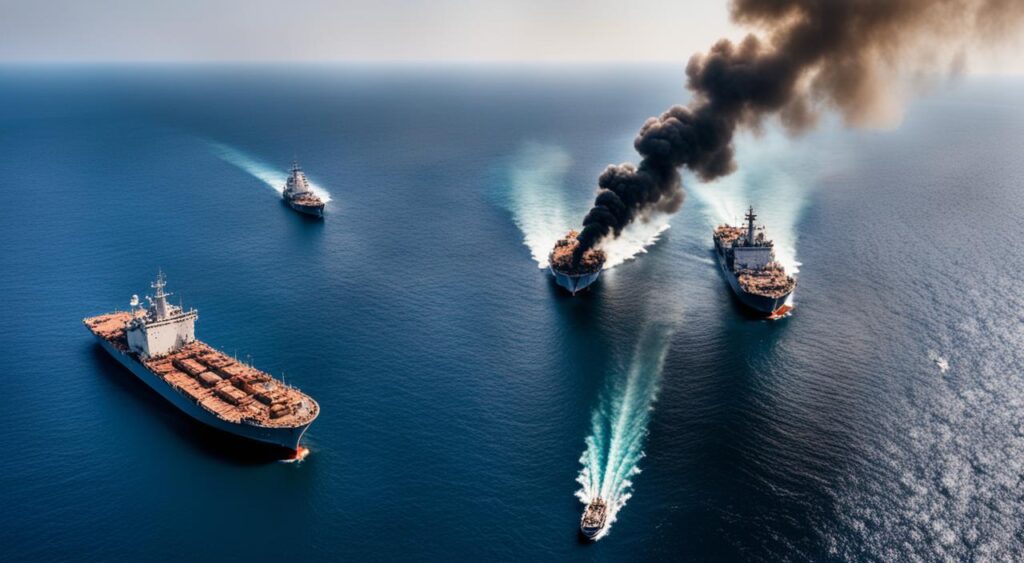
The attacks were well planned and sophisticated. Houthis used explosives and special moves to destroy the ships. This shows how they can cause chaos at sea.
This military clash steps up the conflict in the area. It makes relations between Yemen conflict and Israel tenser. People are also worried about the Houthis’ abilities and resources.
To get why the Houthis are doing this, we must look at the outcomes and why they attacked. This could have big effects beyond just attacking the ships. Tensions might get even higher.
Implications for Yemen and Israel
The Houthis’ recent attacks on sea vessels bring big implications for Yemen conflict and Israel. These threats have the power to greatly shake regional stability. The strategic area now must deal with new dangers on the sea. This makes it necessary to look at the current naval defenses and military strategies closely.
Impact on Maritime Security
The attacks on ships indeed are major maritime security threats. These clashes at sea need smart naval strategies to keep international waters safe. Past world wars show why keeping the seas secure is crucial for the region’s stability and economic health.
Political Repercussions
The attacks have a big political impact. They could change the relationship between Yemen and Israel and affect the wider region’s politics. This could lead to new strategies for international military actions. Tensions are high, which might shift who supports whom and how ambassadors interact. The history of world wars can help us understand these potential changes.
International Reactions
On a global level, these events have sparked different reactions. Some nations might push for talks, while others suggest using force. This shows how varied and complex international military responses can be. In the coming days, we might see many positions being taken, from peace talks to stronger naval protections.
War, battles, conflict: Broader Context of the Escalation
The recent rise in battles in Yemen conflict, especially the targeted attacks on ships by the Houthis, needs detailed study. We must look at their war tactics to see how this fits in with other conflicts globally.
War Tactics Employed
The Houthis mix traditional and modern war methods. Their style of fighting includes surprise attacks and quick movements. This makes their attacks more effective and safer for their own fighters. They use missiles and drones to hit hard, even on the sea, showing their growing strength.
Type of Sea Vessels Targeted
The Houthis don’t just go after military ships. They also aim at commercial and dual-purpose vessels. This choice disrupts both military and economic activities of their enemies. It shows they understand the sea’s strategic importance well. Every ship they hit is a way to change the overall balance of power.
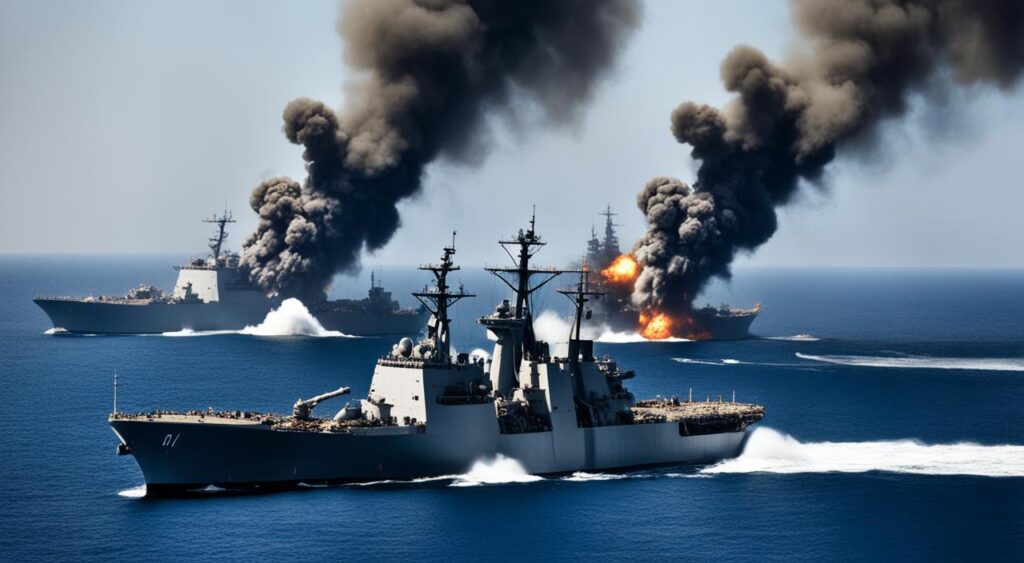
When we look at conflicts, we must consider five main reasons wars happen. Leadership issues, beliefs, and problems with commitments are key reasons. These issues are clearly part of the Yemen conflict.
| Conflict Analysis | Core Reason |
|---|---|
| Yemen conflict | Unaccountable leadership |
| World War I | Unreliable alliances |
| Russia-Ukraine | Commitment problems |
By diving into these reasons and their historical impacts, we better understand conflicts and their changing strategies.
Historical Significance and Milestones
The recent Houthi attacks on sea vessels have highlighted the long story of Yemeni naval history. This event is part of a series of historical maritime battles that have influenced the region’s future. These battles show the mix of strategy, culture, and technology over different timelines and dynasties.
Previous Naval Battles Involving Yemen conflict
Yemen conflict has seen many notable naval fights over its history. The Himyarite Kingdom and others defended the coast against many invaders. These battles showed Yemen conflict strong naval tradition and clever tactics.
Comparison with Other Significant Maritime Conflicts
Seeing these events against significant naval conflicts like those in the American Civil War shows similarities and differences Yemen conflict. For example:
| Conflict | Time Period | Casualties |
|---|---|---|
| Battle of Bull Run/Manassas | July 21, 1861 | 4,700 Union, 2,950 Confederate |
| Battle of Gettysburg | July 1-3, 1863 | 51,000 total |
| Battle of Chickamauga | September 19-20, 1863 | 34,624 total |
Such comparisons show how vital naval strength has always been in warfare. This influence holds true from ancient times to today. Learning from these fights gives us insights into the changing nature of war and significant timelines in military history Yemen conflict.
The Houthis’ recent impact sparks a closer examination of how naval conflicts affect civilizations. Whether through direct fight or via blockades,Yemen conflict these battles often mark major shifts in war and destiny.
Future Prospects: Escalation or Resolution?
The future around the Houthis could go either way, towards peace or more conflict. Major factors like talks and new military technology will shape this path. Tech like AI and data analytics will deeply affect how wars are fought by 2040.
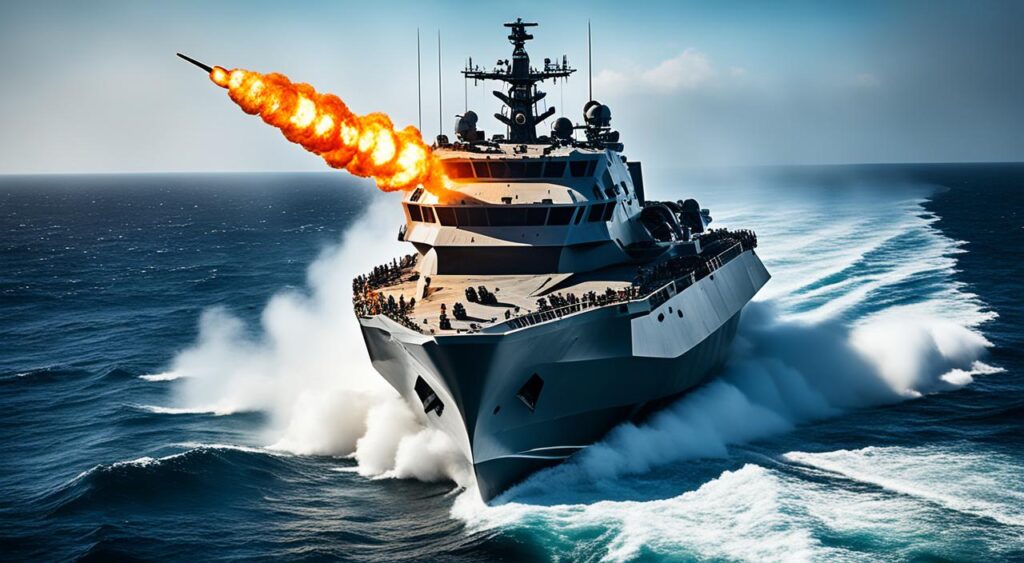
Global efforts are key in deciding if peace wins or if wars continue with high-tech weapons. By 2040, sensors will be much better, making guns and other weapons more accurate and far-reaching.
Predicting tech changes, which happened as early as 1919, is vital. New tech will make warfare more connected and precise. This could help in peace efforts or make wars more efficient.
We need to think about new weapons too, like hypersonic tech and directed energy, for future battles. Russia and China’s updated nuclear arms are big concerns. Self-operating military equipment will change how we fight, with less need for human control.
How we buy and use weapons will affect the Houthis’ fate. History shows peace is possible, pointing towards the value of diplomacy today Yemen conflict.
| Factors | Impact by 2040 |
|---|---|
| Sensor Improvements | More accurate, connected, and destructive weapons |
| AI and Automation | Enhanced decision-making and surveillance |
| Hypersonic Systems | Increasing inventory in long-range precision strikes |
| Directed Energy Weapons | Lasers and high-power microwaves in battlefields |
| Nations’ Military Advancements | Modernized nuclear forces with advanced hypersonic weapons |
| Autonomous Systems | Minimal human interaction in lethal environments |
The way we use tech and learn from the past will decide the Houthi future. Smart and early peace efforts could bring lasting peace Yemen conflict.
Conclusion
Recently, the Houthis’ attacks on sea vessels marked a significant turn in modern maritime warfare. These events deeply impact Yemen, Israel, and the world at large. Looking back at these historical events, it’s clear we must find a new power balance. This balance needs everyone to understand and agree with each other. This is crucial for a true, long-lasting end to such conflicts.
Peace, in the face of complicated international relations, needs strong talks and a solid ceasefire. Many things can help wars end, including people at home against war, changes in who’s strong militarily, and less focus on certain beliefs. So, reaching a lasting peace needs to tackle these issues. It also needs everyone involved to put in the work. This includes keeping up with what they expect to achieve.
Moving ahead, we must think a lot about cultural heritage, the role of advanced weapons, and historical events. Knowing what everyone wants and can do is key to making a deal. Only clear understanding and shared dedication to peace can stop these conflicts for good. This is necessary for a true and lasting peace, creating a new, stable situation.
FAQ
What recent milestone have the Houthis in Yemen achieved?
The Houthis destroyed up to 90 sea vessels. They also attacked three Israeli ships, marking a historic event in their conflict.
Who are the Houthis and what is their background?
The Houthis, known as Ansar Allah, are from northern Yemen. They are a Zaidi Shia-led group. After their founder died in 2004, they became more active, leading to the Yemeni Civil War. They now control Sana’a, the capital.
What details are known about the recent attacks on Israeli vessels?
The Houthis showed strong naval warfare skills in their attack on Israeli ships. This has changed the region’s conflict dynamics and tactics.
What are the implications of the Houthi attacks for maritime security?
The destroyed ships pose a serious risk to the sea’s safety. It challenges the region’s peace and calls for new defense strategies.
What political repercussions might arise from these attacks?
These attacks could lead to stronger military responses and policy changes. They might also increase diplomatic efforts to resolve the conflict.
How has the international community reacted to these attacks?
The global reaction might include calls for peace or harsh sanctions. All these responses will shape the Middle East and global politics.
What war tactics are the Houthis known to employ?
The Houthis mix conventional and new tactics. They show clever and skilled strategies against stronger foes.
What types of sea vessels were targeted in the recent attacks?
Details on the attacked vessels are limited. However, the range of vessels destroyed shows the Houthis’ key objectives.
How do these recent attacks compare to previous naval battles involving Yemen?
These assaults add to Yemen’s history of naval strife. They fit in with past sea conflicts that defined the area’s maritime story.
What is the historical significance of these attacks compared to other maritime conflicts?
These attacks underscore the lasting value of sea power and advanced technology. They are similar to key sea conflicts through history.
What are the future prospects for the conflict involving the Houthis?
The future could bring more tension or a chance for peace. It depends on new military tactics, peace efforts, and diplomacy.
The Yemen-Israel Conflict: Unraveling a Complex Web of Tensions
Introduction
The ongoing conflict between Yemen and Israel is a multifaceted saga that intertwines regional geopolitics, historical grievances, and ideological clashes. While Yemen and Israel are geographically distant, their interactions have far-reaching implications for the Middle East. In this comprehensive 3000-word article, we’ll delve into the roots, dynamics, and consequences of this conflict.
Historical Context
- Origins: The Yemen-Israel conflict traces back to the establishment of the State of Israel in 1948. Yemen, like many Arab nations, rejected Israel’s existence, viewing it as an affront to Palestinian rights and Arab identity.
- Yemeni Jews: Before 1948, Yemen was home to a significant Jewish community. However, tensions escalated during the Arab-Israeli wars, leading to the mass exodus of Yemeni Jews to Israel.
- Cold Peace: Despite the absence of formal diplomatic relations, Yemen and Israel maintained a “cold peace” during the 1990s, focusing on pragmatic interests rather than ideological alignment.
Recent Escalations
- Houthi Attacks: The Iran-backed Houthi rebels in Yemen have escalated tensions by launching attacks on Israel. Their motives remain complex, but they align with Iran’s broader strategy of challenging Israel through proxy groups.
- Strategic Calculations: The Houthis perceive Israel as an extension of Western imperialism and a collaborator with Saudi Arabia, their regional adversary.
- Gaza Connection: The ongoing Israeli-Palestinian conflict in Gaza further fuels Houthi animosity toward Israel. As Tel Aviv continues to bomb Gaza, the Houthis see themselves as part of the broader “resistance axis.”
Iran’s Role
- Proxy Warfare: Iran, a key supporter of the Houthis, views Yemen as a battleground to challenge Israel indirectly. By backing the Houthis, Iran aims to exert pressure on Israel and divert attention from its nuclear program.
- New Fronts: Iran has repeatedly warned that if Israeli strikes on Gaza persist, “new fronts” could open in the war. Yemen serves as one such potential front.
Implications and Regional Dynamics
- Saudi-Israeli Relations: The Yemen-Israel conflict complicates Saudi Arabia’s delicate balancing act. Riyadh seeks to maintain its alliance with the United States (which supports Israel) while managing its regional interests.
- Lebanon and Hezbollah: The Houthis’ actions mirror Hezbollah’s playbook in Lebanon. Both groups challenge Israel through asymmetric warfare, leveraging missile technology and ideological fervor.
- Morocco and the Maghreb: The conflict resonates across North Africa, where Morocco severed ties with Israel in solidarity with the Palestinians. The Yemen-Israel tension reverberates through the Maghreb region.
Conclusion
The Yemen-Israel conflict is a microcosm of broader regional tensions. As the Houthis continue their attacks and Iran flexes its influence, the situation remains volatile. Diplomatic efforts, regional dialogue, and a nuanced understanding of historical grievances are essential to untangling this complex web of hostilities.

